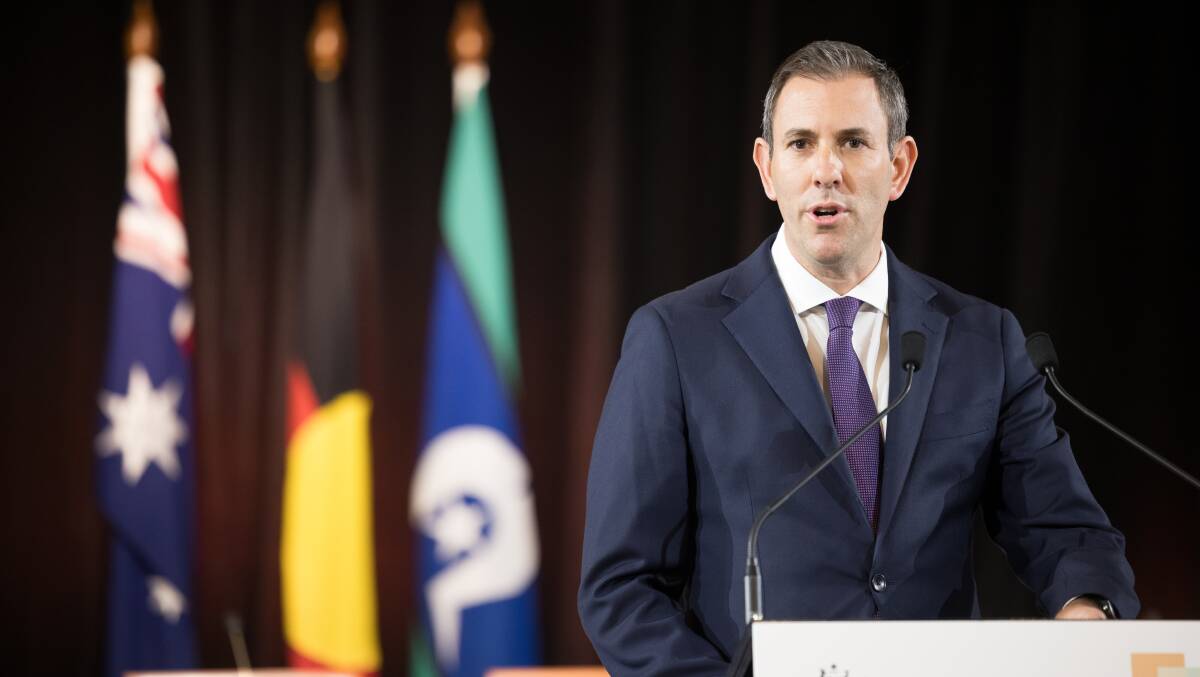
The budget is the purest expression of the federal government's priorities. Like elections, budgets are always a good time to ask ourselves exactly what kind of country we want Australia to be.
Subscribe now for unlimited access.
or signup to continue reading
Let's face it, Australia has some big problems to solve that require significant public spending. There's a cost-of-living crisis, an aged care crisis, a GP crisis and a climate crisis - to name just a few. (Is it just me, or does it seem like once-in-100-year storms, floods, bushfires and heatwaves now occur at least once a year?)
These are bread and butter problems, but can these challenges be met by a bread and butter budget?
To address these problems will require public spending, that's the bit that everyone likes talking about. There are few who would argue against boosting aged care spending following the royal commission's shocking findings. Everyone wants access to a local GP. Even Peter Dutton supports more public spending on Defence.
The real question is, how do we fund it? Australia, it's time to talk about revenue.
The Australia Institute's Revenue Summit last week kicked off this important national conversation. Keynote speaker Rod Sims, former chair of the ACCC, laid it out plainly for the government: "If you want to spend extra money, you're going to have to raise extra revenue. There's just no avoiding that."
Sims reminded the audience not only is Australia among the lowest-taxing countries in the OECD - about six percentage points of GDP below the developed country average - it's also among the lowest in terms of expenditure levels, as well. His point is that expenditure and revenue go hand-in-hand. You can't really separate them, yet so often our national debate divorces one from the other.
The fact is countries that have higher taxes than Australia have economies that are more productive than ours, but most importantly, they enjoy better services than us and are happier than we are. It's not rocket science; higher revenues enable higher public spending levels. But for the last few decades we've been pretending Australia's low-taxing economy can deliver the kind of public services countries like Finland, Denmark, Sweden and Norway enjoy. It can't.
Instead we have the kind of low-taxing economy that delivers an aged care system where half of residents are at risk of malnutrition or are malnourished.
Luckily, these are problems Australia can solve, in part by collecting more revenue. Sims helpfully suggested the government pursue five tax reforms: stopping multinational tax avoidance; taxing the economic rents of mining and petroleum companies by fixing the flawed Petroleum Resource Rent Tax (PRRT); introducing a carbon tax; replacing stamp duty with a land tax; and a congestion charge for road users.
All completely sensible, economically sound suggestions. The problem is while the economic answers to our revenue problems are obvious, the politics is difficult.
Take the carbon tax, which Sims described as a "completely obvious" tax reform. Because of the toxic politics of climate change in this country, as well as the huge political power and influence of the fossil fuel sector in Australia, talking about a carbon tax has become taboo.
Perhaps this new Parliament, with its climate super-majority in both houses, can be the one to break that taboo. Certainly, there is an appetite to reform how we tax our fossil fuel resources, as discussed by Greens Senator Barbara Pocock and independent MPs Zoe Daniel and Allegra Spender on the Revenue Summit's crossbench panel. There is no doubt the PRRT is broken. Gas companies, in particular, are raking in windfall profits and Australian consumers are paying the price. A windfall profits tax is an absolute no-brainer, but there hasn't been much talk of that kind of tax reform, either.
Chief Minister (and ACT Treasurer) Andrew Barr told the Revenue Summit about the ACT's success in its reform package to, over time, replace stamp duty with a highly efficient land tax. NSW has just introduced a voluntary land tax scheme for first home buyers. But few other states have pursued this important reform.
And of course, Federal Treasurer Jim Chalmers ruled out any changes to the stage 3 tax cuts in the October budget. This is disappointing, but not unexpected. The politics of breaking an election commitment is not trivial, but neither is it insurmountable.
As former RBA governor Bernie Fraser told the summit: "There's no honour in the government standing by what, in truth, is really a very dodgy commitment and hardly an unbreakable one in current circumstances."
READ MORE EBONY BENNETT COLUMNS:
By almost any measure the stage 3 tax cuts are a terrible idea and the Labor government knows it. They will cost one-quarter of $1 trillion - half of which will go straight to high-income earners, mostly men - while low-income earners miss out. And let's be clear, someone earning $120,000 is in no way a middle-income earner, as some sections of the media and Opposition are asserting. The median income in Australia is around $63,000, meaning half of Australians earn below $63,000.
As cost-of-living pressures bite into household budgets, the politics of delivering $9000 per year tax cuts to Members of Parliament, CEOs and surgeons isn't great, either, not when aged care workers and those on minimum wage will receive nothing from the stage 3 tax cuts.
Even if the Treasurer doesn't scrap the tax cuts in this budget, there are plenty of opportunities to make the right decision before they begin in July 2024. The poor economics of the stage 3 tax cuts are obvious, but the politics will only get more interesting.
- Ebony Bennett is deputy director of leading public policy think tank the Australia Institute. @ebony_bennett


